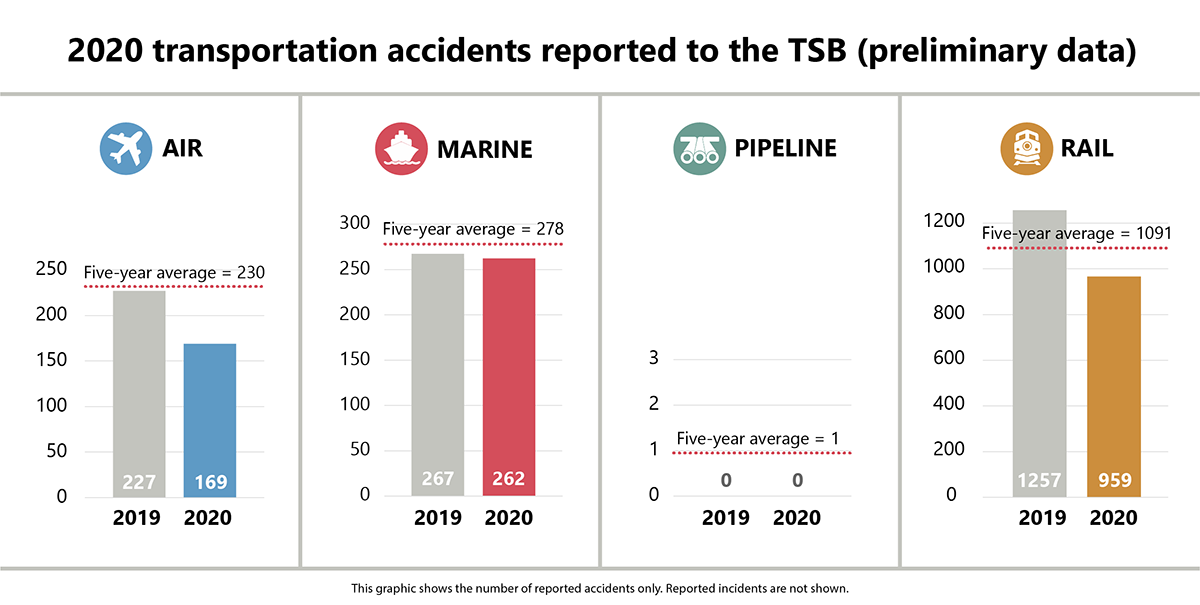TSB preliminary statistics show decrease in number of air and rail occurrences in 2020
Following an initial review of its 2020 data, the Transportation Safety Board of Canada (TSB) is today providing a summary of preliminary transportation occurrence statistics. The 2020 data indicate an overall reduction in the number of accidents / incidents for the Air and Rail sectors, which were likely influenced by the impact of COVID-19 on the transportation industry and other disruptions in service.
Data table
| 2020 | 2019 | Five-year average | |
|---|---|---|---|
| Air accidents | 169 | 227 | 230 |
| Marine accidents | 262 | 267 | 278 |
| Pipeline accidents | 0 | 0 | 1 |
| Rail accidents | 959 | 1257 | 1091 |
Air transportation
TSB air transportation occurrence data for 2020 show the effects of a decrease in aircraft movements during the COVID-19 pandemic, particularly in commercial aviation. According to Statistics Canada data,Footnote 1 there were approximately 43% fewer commercial, and 19% fewer private / government, movements in 2020 (January – November) compared to the same period in 2019. The number of aviation accidents (169) reported to the TSB in 2020 was about 36% lower than the five-year average of 230. There were 12 fatal accidents that caused 16 fatalities in 2020, compared with 33 fatal accidents and 70 fatalities in 2019. Also, accidents involving commercial operators decreased from 83 in 2019, to 53 in 2020 (a reduction of approximately 36%), while those involving private operators (CAR 604, recreational, and other private operations) decreased from 143 to 114 (a reduction of approximately 20%).
There were 419 aviation incidents reported to the TSB in 2020. This number represents a decrease from the previous year (915) and from the five-year average (867).
Marine transportation
In 2020, 262 marine accidents were reported to the TSB, similar to 2019’s total of 267 and about 6% below the five-year average of 278. The number of fishing vessels involved in accidents (shipping accidents and accidents aboard ships) in 2020 (87) was higher than the previous year (78), but lower than the five-year average (93), with seven of the nine fatal marine accidents and 16 of the 18 marine fatalities involving the commercial fishing industry. Commercial fishing safety has been on the TSB Watchlist since its inception in 2010.
Some 925 marine incidents were reported to the TSB in 2020. This number represents a 2% decrease from 2019 (948) but a 9% increase from the five-year average of 848. Most (82%) reportable incidents were categorized as “total failure of machinery or technical system.”
Pipeline transportation
There were no pipeline accidents in 2020; all occurrences during the year were incidents. A total of 80 pipeline occurrences were reported to the TSB in 2020; this is above the total of 52 in 2019 but below the five-year average of 99. The number of pipeline occurrences involving a release of product was lower in 2020 than in previous years (18 in 2020 compared with 23 in 2019 and five-year average of 48). Twelve of the 18 occurrences in the “product released” category in 2020 involved a release of hydrocarbon gas.
Thirty-three percent (26) of pipeline incidents in 2020 involved geotechnical/hydrotechnical/ environmental activity, compared with 25% in 2019 and the five-year average of 16%.
Railway transportation
Overall, 959 railway accidents were reported to the TSB in 2020 – a 12% decrease from the five-year average of 1091 – and 59 rail-related fatalities reported in 2020, 13 fewer than the previous year and slightly below the five-year average of 63.
Thirty-nine of the 2020 fatalities involved trespassers (66% of all rail fatalities), compared with 38 (53%) in 2019 and the five-year average of 40 (63%). Crossing accident fatalities decreased from 28 to 18 in 2020, similar to the five-year average of 20. The TSB is researching seasonal patterns in crossing accidents to better understand some of the factors that may be contributing to these occurrences.
Among all railway accidents reported to the TSB in 2020, 81 involved dangerous goods (DG), a decrease from 2019’s total of 171 and below the five-year average of 128. Three accidents in 2020 resulted in a DG release.
There were 26 accidents involving an uncontrolled movement and 19 incidents categorized as “uncontrolled movement of rolling stock” in 2020, compared with 62 and 16 respectively in 2019 and the five-year averages of 46 and 14 respectively.
Additionally, 227 railway incidents were reported to the TSB in 2020 – representing a 7% decrease from 2019 (243) and a 21% decrease from the five-year average (287). However, two thirds (151) of all railway incidents in 2020 were categorized as “movement exceeds limits of authority” incidents, 15 more than in 2019 and 17 more than the five‑year average of 134.
For more information, please refer to the detailed statistical tables in the December 2020 transportation occurrence statistics for air, marine, pipeline, and rail transportation. Note that data for the 2020 period can be found under Year to date (December).
The TSB will release its complete and final statistical reports for 2020 in the spring; these will include accident rates and a more thorough analysis of the updated data (which may vary slightly from this preliminary data).
The TSB is an independent agency that investigates air, marine, pipeline, and rail transportation occurrences. Its sole aim is the advancement of transportation safety. It is not the function of the Board to assign fault or determine civil or criminal liability.
For more information, contact:
Transportation Safety Board of Canada
Media Relations
Telephone: 819-360-4376
Email: media@tsb.gc.ca
